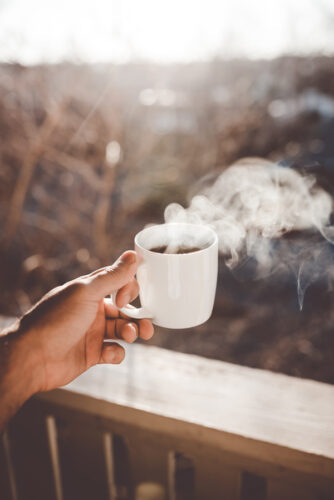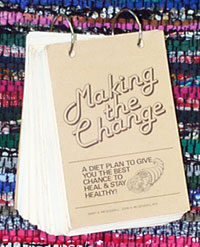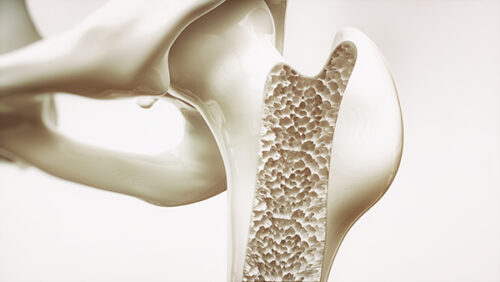Coffee – Pleasure and Pain

This article originally appeared in the July 2004 McDougall Newsletter and has been updated in June 2022.
By John McDougall, MD
Quitting is Better Than a Lifetime of Medications or Worse
Of the world’s population, 80% consumes caffeinated beverages – Coffee is the most widely consumed of all these stimulating drinks. The user is seeking enhancements in mood, mental performance, and physical activity. (Starbucks’ popularity can be directly tied to the potency of their brew – 550 mg of caffeine per Coffee Grande.) Within minutes of that first morning cup, people become keener, more alert, and wide awake. Not only is the mind awakened but so are the bowels – a cup of coffee starts the day right with a vigorous elimination. For some people, coffee serves as a weight loss aid by suppressing appetite and increasing metabolism (burning calories).
New research has found that a single cup of coffee, ingested 30 minutes prior to memory testing, completely reverses the memory decline experienced by older adults in the afternoon.1a Biologically active compounds found in coffee have also been reported to extend longevity.1b This research is encouraging, but contradicts previous studies that suggest an increased risk of heart disease with coffee drinking. The newer conclusions will likely be well received, because “people like to hear good news about their bad habits.” If not for the side effects, this might be the ideal legal, mind-altering, drug. But, as with all drugs, there are prices to be paid.
Raise Your Cholesterol by 10%
Coffee contains several hundred different substances (in addition to well-known caffeine) and many of these have powerful pharmacological effects on the human body. Two cholesterol-raising substances – cafestol and kahweol – are found in coffee beans. Not only do they raise total cholesterol, but also “bad” LDL-cholesterol and triglycerides, too.1 On average, cholesterol is increased by 10%; but very potent boiled coffee can raise total cholesterol by as much as 23% (that could mean a 50 mg/dl increase for someone starting with an average cholesterol of 210 mg/dl). Triglycerides may be increased by a similar amount.
The overall effect of elevated cholesterol could be a higher risk of heart attacks and strokes. Heavy consumption – greater than 4 to 9 cups of regular coffee a day – does appear to actually translate into an increased risk of heart attacks. In relevant numbers, a 10% increase in cholesterol could boost your risk of death from heart disease by 20% to 30%. Considering, that cholesterol-lowering medications (statins) accomplish about a 10% reduction in cholesterol; you may decide to stop this daily drink, rather than start daily drugs.
Fortunately, these substances lose their potency when poured through a paper filter. Most coffee makers in use today drip water through coffee grounds held by a filter. The paper effectively traps the cafestol and kahweol; and as a result, a person’s cholesterol and triglyceride levels are little affected by this filtered beverage. Instant coffee is almost devoid of cafestol and kahweol, and would also be a good choice for someone only concerned about the cholesterol-raising effects of coffee.
Decaffeination does not reduce the levels of cafestol and kahweol; you can expect similar raises (10%) in your cholesterol and triglycerides with decaf coffee, just as you would with unfiltered regular coffee. But switching to decaf can be expected to reduce nervousness and insomnia from the caffeine.
You may be able to negate the cholesterol-raising effects of coffee with a paper filter, but not the other heart disease – and stroke-producing consequences of this beverage, such as an elevation in blood pressure.
Raises Blood Pressure
Coffee causes the blood vessels to constrict and the heart to beat stronger, resulting in an elevated blood pressure for most people. Within minutes of drinking this concoction of invigorating chemicals, the systolic blood pressure (top number) can rise 5 to 15 mmHg and the diastolic (bottom number), 5 to 10 mmHg.2 One 5-ounce (150 ml) cup of regular coffee contains 150 mg of caffeine – a substance known to raise blood pressure. However, decaffeinated coffee also increases blood pressure; therefore, ingredients found in the coffee bean other than caffeine also have pressure-raising effects.3
The first sips of coffee cause the greatest amount of stimulation. As more is consumed throughout the day (past the second cup) the elevations in blood pressure from subsequent cups are less than those caused by the initial doses.2 After an overnight abstinence the sensitivity to that initial morning cup of coffee is fully restored. Contrary to popular belief, with continued use (habitual coffee drinkers) people do not become tolerant (develop immunity) to these blood pressure raising effects.2
The overall effect of coffee consumption for an average population (i.e., people in the USA) is about 2 to 4 mmHg elevation of blood pressure. Lowering blood pressure by 2 to 3 mmHg by using commonly prescribed medications is believed to produce a lifesaving benefit. For example, a 2 mmHg reduction in systolic blood pressure would translate into a 7% decrease in heart disease and 10% decrease in strokes (according to some research). This could be interpreted to mean population-wide cessation of the use of coffee would lead to a decrease in premature death from heart attacks by 14% and strokes by 20%.2
Burns Your Stomach
Coffee is upsetting to the stomach. Every serious coffee drinker keeps a bottle of Tums handy. Both regular and decaffeinated coffees cause indigestion by reducing the function of the lower esophageal sphincter – a valve that prevents the stomach acid from refluxing up into and burning the esophagus.4-6 Regular coffee and decaffeinated coffee both stimulate acid production in the stomach by similar amounts.7-8 Therefore, caffeine is not the cause of either of these effects – other substances in the coffee are creating the heartburn and reflux. Therefore, for relief, coffee drinkers must switch beverages to something like herbal tea or water. Fortunately, even though there is considerably more indigestion among coffee drinkers, there is no increase in the risk of stomach or duodenal ulcers.9
Other Reasons to Quit
Irregular heart beats (arrhythmias), nervous tremor, headaches, anxiety, teeth-grinding, jaw-clenching, insomnia, frequent urination, elevated eye pressure (glaucoma), diarrhea, osteoporosis and periodontal diseases may be other reasons to add to your list for quitting. When the fear of future health problems, like heart attacks, and the suffering from anxiety, indigestion, and the urge to urinate every few minutes becomes sufficiently troubling, you then may decide life would be better without this upsetting drug.
How to Quit
Coffee consumption causes physical dependence – you are addicted – making quitting difficult and painful. Headaches, fatigue, depression, and sleepiness can be expected when use is suddenly stopped. Withdrawal symptoms begin within 12 to 16 hours and peak at 24 to 48 hours. This process may last as long as one week.
There are two ways to quit; first and best is to simply stop the coffee and suffer the withdrawal. Some of the symptoms, such as the headache, can be effectively relieved with common analgesics, such as aspirin or Tylenol. There are also immediate rewards, such as almost overnight relief of the indigestion and urinary frequency, which should keep you motivated.
A less painful way to quit coffee is by substitution with another source of caffeine, such as black or green tea. Teas have fewer side effects (and maybe a few health benefits from their antioxidants and other phytochemicals), but they still offer a lift in the morning. (There is some evidence that caffeinated teas can also raise blood pressure, but not cholesterol.10) Then, over time, you can reduce the dosage of caffeine by making your beverage weaker – eventually switching to a non-caffeinated, herbal tea. You’ll be glad you did.
Here is one more example of how powerful you can be over your present state of health and well-being, and in control of your destiny by being informed and acting on this cost-free information.
References:
1a) Sherman SM, Caffeine Enhances Memory Performance in Young Adults during Their Non-optimal Time of Day. Front Psychol. 2016 Nov 14;7:1764.
1b) O’Keefe JH, Coffee for Cardioprotection and Longevity. Prog Cardiovasc Dis. 2018 May-Jun;61(1):38-42.
1) Urgert R, Katan MB. The cholesterol-raising factor from coffee beans. Annu Rev Nutr. 1997;17:305-24.
2) James JE. . Critical review of dietary caffeine and blood pressure: a relationship that should be taken more seriously. Psychosom Med. 2004 Jan-Feb;66(1):63-71.
3) Corti R, Binggeli C, Sudano I, Spieker L, Hanseler E, Ruschitzka F, Chaplin WF, Luscher TF, Noll G. Coffee acutely increases sympathetic nerve activity and blood pressure independently of caffeine content: role of habitual versus nonhabitual drinking. Circulation. 2002 Dec 3;106(23):2935-40.
4) Van Deventer G. Lower esophageal sphincter pressure, acid secretion, and blood gastrin after coffee consumption. Dig Dis Sci. 1992 Apr;37(4):558-69.
5) Wendl B. Effect of decaffeination of coffee or tea on gastro-oesophageal reflux. Aliment Pharmacol Ther 1994 Jun;8(3):283-7.
6) Pehl C. The effect of decaffeination of coffee on gastro-oesophageal reflux in patients with reflux disease. Aliment Pharmacol Ther. 1997 Jun;11(3):483-6.
7) Cohen S. Gastric acid secretion and lower-esophageal-sphincter pressure in response to coffee and caffeine. N Engl J Med. 1975 Oct 30;293(18):897-9.
8) Cohen S. Pathogenesis of coffee-induced gastrointestinal symptoms.
N Engl J Med. 1980 Jul 17;303(3):122-4.
9) Elta GH Comparison of coffee intake and coffee-induced symptoms in patients with duodenal ulcer, nonulcer dyspepsia, and normal controls. Am J Gastroenterol. 1990 Oct;85(10):1339-42.
10) Quinlan PT, Lane J, Moore KL, Aspen J, Rycroft JA, O’Brien DC. The acute physiological and mood effects of tea and coffee: the role of caffeine level. Pharmacol Biochem Behav. 2000 May;66(1):19-28.
Recommended Articles

Vitamin D: Values for Normal Are Exaggerated

Stumbling Blocks to Dietary Transition






